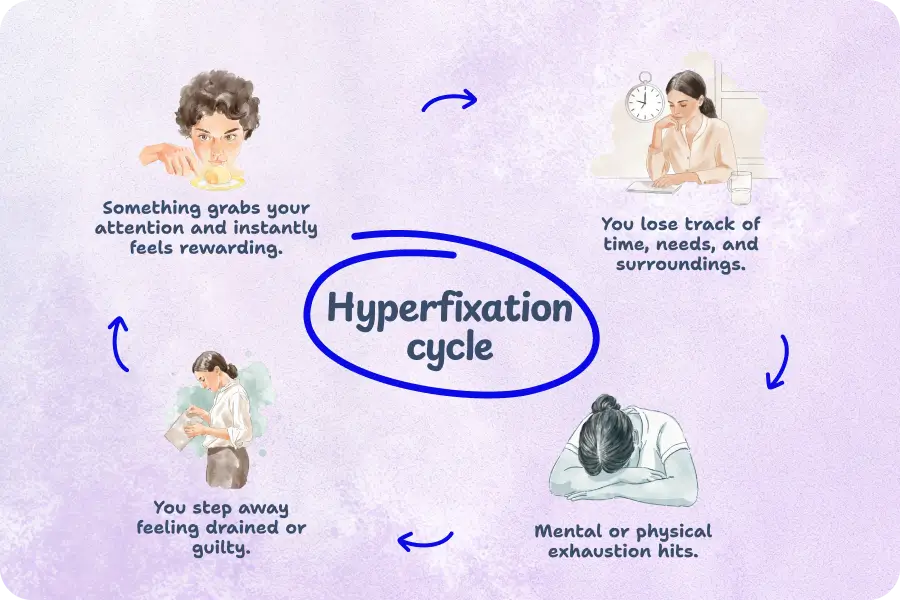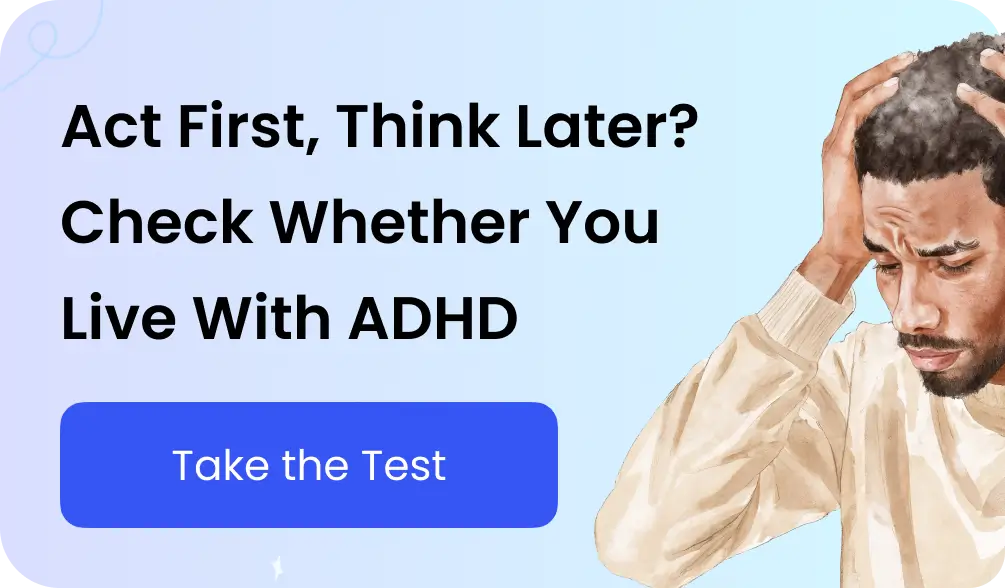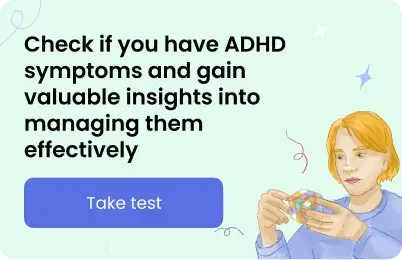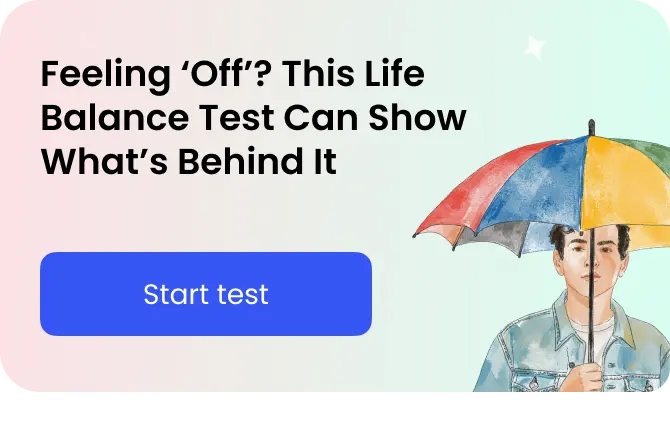Remember the last time you read a gripping book series. You may want to keep turning the pages every day after work without interruption. This is how intense interest feels. But when hyperfixation occurs, you become so engrossed in something that you lose track of time and forget to respond to your friends or even attend to important responsibilities.
In this article, we’ll explore what ADHD hyperfixation is, what triggers it, and how it differs from other states. Continue reading to discover practical strategies for overcoming hyperfixation and switching between tasks effortlessly.
What is hyperfixation?
Hyperfixation is an intense, long-lasting focus on a specific topic or activity that makes a person neglect important responsibilities. When hyperfixated, people may lose awareness of their basic needs (for instance, forgetting to eat or sleep) and become totally consumed by the task for hours without realizing how much time has passed.
While hyperfixation isn’t an official medical term, it is used in the medical community, particularly when talking about ADHD symptoms. Yet, people without mental health conditions can experience hyperfixation as well.
Hyperfixation is closely related to another clinically recognized phenomenon — hyperfocus. They both stem from how the brain’s reward system works.
Studies show that people with ADHD use less mental effort in the frontal lobe (the area responsible for controlling attention) during tasks they find engaging. Certain brain waves linked to enjoyment and internal motivation become stronger. [1] This shift may happen because people’s brains release more dopamine during interesting tasks, creating a “reward boost” that keeps us focused for long periods. [2]
Have you ever experienced hyperfixation?
Is hyperfixation a symptom of ADHD?
While officially, hyperfixation isn’t a symptom in the ADHD iceberg, it’s common for people living with neurodiversity. Even though ADHD is an attention-deficit disorder, it can co-exist with hyperfixation. ADHD is more about attention abundance than about attention deficit. It means that people experiencing this cognitive difference find it challenging to regulate their focus.
Consequently, switching between tasks may be as challenging (or even more challenging) than being totally absorbed in one activity. As a result, people with a wealth of attention can have difficulties shifting focus and tend to hyperfixate. OCD hyperfixation and autism hyperfixation are also quite common.
If you experience something similar to hyperfixation and think you might be neurodivergent, Breeze has something for you. Take a test to get insights into your mental well-being and uncover personalized recommendations.
Hyperfixation symptoms
Main symptoms of ADHD hyperfixation may involve losing track of time, getting completely absorbed in the activity, and feeling unable to shift focus to the point where a person starts ignoring the world around them. Other symptoms may include:
1. Neglecting responsibilities and important tasks
ADHD hyperfixation can be difficult to distract from, even when there’s an urgent need to switch tasks. Because of this, a person may postpone work assignments, household chores, or personal obligations. They can miss deadlines and forget about promises, even though it can have negative effects on work performance and relationships with others.
2. Not noticing physical signs like hunger and thirst
For a hyperfixated person, only the fixation matters. They may completely ignore basic bodily needs because their attention is fully absorbed in the present moment. It can even lead to poor hygiene and neglect of self-care in general.
3. Losing interest in activities you planned before
An adult ADHD brain may constantly seek reward and choose activities that sound immediately engaging. As such, if a new video game becomes a person’s hyperfixation, they can suddenly cancel plans with friends and put aside previously exciting hobbies.
4. Avoiding communication with others
Hyperfixation can be so intense that a person may avoid all forms of communication. Not answering phone calls, ignoring messages, and skipping days at the office may signal that someone is fully absorbed in their focus, maybe even unaware of how much time has passed.
5. Feeling disoriented after a hyperfixation episode
After hyperfixation on a particular topic ends, people may have difficulty recalling what was happening around them. They might experience challenges managing routine tasks and getting their life together for some time after a hyperfixation episode.

How long do hyperfixations last?
Duration of hyperfixations can be different, from a few days to a few years. We can divide hyperfixation periods into short-term and long-term ones.
- Short-term hyperfixations mean that a person can be fully absorbed into something for a couple of months or less. Imagine yourself purchasing a book series and binge-reading it over a week or learning how to play a musical instrument obsessively for days, only to lose interest just as quickly.
- Long-term hyperfixations may last from a few months to years. They can turn into an area of deep interest that becomes an important part of someone’s life. While a person may not spend every free minute on the fixation, it remains a constant thread of focus.
Here’s a comment from a Reddit user who has experienced various hyperfixations: “Mine have lasted from a couple of weeks to several years (and still counting). It depends a lot on me on how much material there is to consume and how much it resonates with me.”
What causes ADHD hyperfixation — 5 reasons
ADHD hyperfixation refers to the brain’s ability to concentrate, which is different among neurodivergent people compared to neurotypical ones. Due to low levels of dopamine, poor impulse control, and challenges with emotional regulation, a person may experience prolonged interest in certain topics.
1. Differences in the brain functioning and dopamine deficit of people with attention-deficit/hyperactivity disorder
People living with ADHD may face dopamine deficiency or difficulties with processing dopamine in the brain. As a result, it takes immeasurable effort for them to focus on monotonous tasks like cleaning, laundry, or ironing. [3]
At the same time, highly stimulating activities trigger stronger dopamine responses in the ADHD brain, which naturally support attention and reduce the need for deliberate effort. [4] New, variable, and rewarding tasks stimulate their brain functioning and provide a sense of accomplishment. Thus, people want to engage in them more and more.
2. Emotional dysregulation
Challenges with emotional regulation are a common ADHD symptom, which might also lead to hyperfixation. To process emotional information and escape unpleasant feelings, people with ADHD may overly focus on something else. Playing a video game for the whole night can help temporarily “escape” daily challenges and take a break from stress.
3. Lack of impulse control
People with ADHD can find it challenging to regulate impulses, which means they can quickly dive into an activity before evaluating whether it’s the right time or priority. Once they start, that same difficulty with self-regulation makes it hard to pull themselves out of the task.
The brain can “lock on,” and because stopping requires inhibitory control (which is already reduced), the person may stay absorbed far longer than intended. This combination of acting on impulses and difficulty interrupting them can turn a simple interest into a prolonged hyperfixation episode.
4. Anxiety and stressful environment
While the reasons mentioned above are the main drivers of any hyperfixation episode, the following causes may influence their frequency and severity (but can’t lead to hyperfixation on their own).
Hyperfixation can become a coping mechanism that helps people distract themselves from life challenges. Psychological research has found that 50% of adults with ADHD report severe to extremely severe symptoms of anxiety [5]. So the intense focus on something distinct can temporarily provide a distraction from daily challenges.
This scenario happened to Luke from the Netflix film “To the Bone.” The character lives with anorexia and body dysmorphia while having a hyperfixation on food and training. This extreme focus helps him distract from severe life issues and provides a feeling of “control” over his life.
If you’re looking for ways to calm your anxiety and take care of your mental health, it may be helpful to try Breeze. The app allows you to track your feelings, journal emotions, and take self-discovery tests to learn more about what triggers your anxiety. Over a few weeks of usage, you’ll notice better self-awareness and will be able to regulate emotions much better.
5. Physiological factors
Poor lifestyle habits can weaken emotional regulation and brain function [6], so a person with ADHD may find it more challenging to handle impulses and overcome stress without getting overly fixated on various activities. The factors that might trigger hyperfixation include:
- Poor eating habits
- Lack of physical activity
- Insomnia or other problems with sleep
- Hormonal fluctuations
- Substance abuse
Key differences between hyperfixation and other states
Some people may confuse hyperfixation and hyperfocus, special interest, and obsession. Check out the differences to gain a better understanding of what happens to you.
Hyperfixation and hyperfocus
Hyperfocus is a deep concentration on a specific task. This is the desired flow state that many people try to reach when they’re working or doing creative things. The need to do something to reach the goal drives people to stay hyperfocused.
Hyperfixation doesn’t involve any goal except pure enjoyment from the process. People do something they take pleasure in. Hyperfixation isn’t time-limited. As you don’t have a goal, you can engage in something as long as you’re interested.
Hyperfixation and special interest
Special interest always involves extreme engagement in a particular topic. You may be interested in cars, football, cooking, or singing. Most people have special interests, which can turn into their hobbies and occupations.
Usually, people don’t get lost in their interests and pay attention to them in their free time. They can perform everyday tasks, spend time with loved ones, and maintain a balanced lifestyle.
Hyperfixation is more temporary and absorbing. It can last days or weeks. During this time, people tend to ignore everything that is out of their deep focus. They lose track of time, “turn the world off,” and may forget to eat, sleep, or communicate with other people.
Hyperfixation and obsession
Obsession is one of the main symptoms of obsessive-compulsive disorder. However, people without OCD may experience it as well.
The main difference between obsession and hyperfixation is that obsession comes from intense fear and anxiety. Repetitive and intrusive thoughts lead to numerous “what ifs” and make people feel stressed, constantly thinking about the theme of obsession.
Compulsions are another aspect that may come with obsessions. These are mental or physical actions that people do to avoid uncertainty. For example, a person may clean the house three times a day or clap their hands before leaving the house.
Hyperfixation is different. It usually involves focusing on a pleasant activity that brings enjoyment rather than stress. Also, when people are hyperfixated, they don’t experience compulsions.

ADHD hyperfixation examples
People may get hyperfixated on hobbies, places, films, or fictional universes, specific topics, or even other people. Here are some of the examples.
1. Hyperfixation on food
For people with ADHD, it may be easier to stick to a habitual (comfort) food when there are so many options. Especially when the food is simple, like peanuts or bananas, or easy to order, like pizza, the brain can focus on the immediate reward with minimal effort. This is particularly important for people experiencing executive dysfunction.
2. Intense focus on a person
It’s normal to fall in love with someone or be a big fan of someone. Still, sometimes what starts as a deep interest turns into a hyperfixation on a crush. Think about K-pop fans who obsessively follow their idols, memorizing every detail about their lives and spending hours online watching their performances. They can even change their appearance to look like a favorite idol.
No one can draw a clear line between being a fan and having an overly extreme interest. Besides, if you find yourself thinking, “I do not control the hyperfixation,” it may be an alarming sign.
3. Hyperfixation hobbies
Sometimes, this kind of hyperfixation can bring some benefits to your life and lead to rapid skill development. But if you start and drop something really quickly without noticing the progress, it might cause frustration.
Remember Mabel Pines from Gravity Falls. She has a hyperfixation with crafting and creating art projects. Whether Mabel knits a sweater, makes friendship bracelets, or works on an elaborate art piece, her enthusiasm for crafting shines through.
4. Hyperfixation on a place
Neurodivergent hyperfixation on a place can be pretty different. You may want to:
- Visit a certain place in your city again and again.
- Move to another country and constantly read about its history, culture, and local customs.
- Collect travel guides, maps, and souvenirs related to your favorite destination.
- Research and watch YouTube videos about the secrets of a certain place.
5. Extreme focus on physical or mental health
People who tend to experience both hyperfixation and a high level of anxiety may be overly concentrated on their wellness. They can spend hours researching diets and training programs or visit health checkups every few months. They might become obsessed with what they eat, how long they sleep, and their recovery level, while even the slightest deviation from their routine can cause anxiety.
Taking care of wellness is always good. But when your thoughts become a source of stress, they may start interfering with daily life or even lead to an eating disorder. So, if you notice that hyperfixation makes you feel constantly on edge, it may be helpful to reach out for professional help.
The pros and cons of experiencing hyperfixation
Neurodivergent hyperfixation can have both positive and negative effects on daily life. Let’s explore them in detail.
Pros
- Deep knowledge acquisition. A person can quickly develop skills or learn a lot of new things when they fully immerse themselves in a particular topic.
- Sense of purpose. Intense passion for something, whether learning more about style or writing a novel, adds meaning to life.
- Increased productivity. If the topic of hyperfixation is something work-related, there’s a high chance a person can achieve significant results in a short time.
- Better creativity. The same works for creative tasks. ADHD hyperfixation can be a great boost to create a painting or come up with a business idea you’ve never thought of before.
Cons
- Neglecting other tasks. If ADHD hyperfixation lasts longer than a few hours, it can interfere with a person’s plans and lead to challenges managing other tasks and work obligations.
- Financial strain. Some hobbies and passions require money, and long-term hyperfixation can lead to impulsive spending that runs out of your typical budget.
- Lower self-esteem. When a hyperfixation episode is over, a person may experience guilt about how much time they’ve spent on something they now consider unimportant.
- Possible arguments with close ones. If someone experiences hyperfixations regularly, their personal relationships might get worse. Such a person may unintentionally ignore friends or family, cancel plans, or seem emotionally distant because their attention is fully absorbed in the activity.
Expert Insight
“Hyperfixations can vary widely from person to person. While hyperfixation can be a positive experience, providing a sense of purpose and enjoyment, it can also interfere with daily functioning if it leads to neglect of important obligations.”
Rychel Johnson
Mental health professional
5 tips to manage ADHD hyperfixation
While intense focus isn’t initially bad, sometimes it can negatively influence our lives. Thus, here are some management strategies to deal with hyperfixation.
1. Think about whether it can be a coping mechanism
To analyze the reasons why you may experience hyperfixation, you can take a notebook and list everything you may try to “run away” from. Or you can use Breeze’s journal and note all your worries.
If hyperfixation truly stems from an external trigger that causes anxiety, it may be reasonable to address its underlying cause. Take steps toward overcoming the stressful situation, and you’ll feel more in control of your life in general.
2. Set boundaries
Sometimes there’s no need to stop hyperfixation but rather to ensure that it doesn’t interfere with your responsibilities, relationships, or well-being. These are some tips that may be worth trying:
- Schedule regular breaks that you’ll enjoy. You can pause to savor a meal or enjoy a conversation with a friend. When experiencing hyperfixation with ADHD, it can be easy to forget about everything. Let the alarm remind you about other aspects of your life.
- Set a timer for transitions, not the activity itself. For example, you can plan when to start wrapping up with the activity, not when to stop completely. This feels less abrupt and can work better for ADHD brains.
- Create “buffer rituals” (like closing tabs, changing your seat, or playing one song) that signal your brain to slow down and prepare to switch tasks.
- Check in with your body. You can also set an alarm every few hours to get water, go to the bathroom, or go for a walk to take care of yourself.
- Limit hyperfixation to a certain location. You can enjoy doing a specific activity in the living room while managing work tasks at the desk. When you leave the area, the brain can recognize the need to shift.
3. Discuss the new area of focus with close ones
It may be helpful to let friends and family know that you’ve found a new passion. You can explain to them that you may be unavailable for social gatherings for some time. However, it’s also essential to find compromises and agree on moments you stay connected. This will help you avoid distancing yourself from people who matter to you.
4. Practice mindfulness and meditation
While ADHD and hyperfixation can go hand-in-hand, some grounding techniques may help you handle them. Mindfulness and meditation might teach you to stay in the present and navigate intense interests more intentionally. Here’s a simple mindfulness activity that you can try:
- Set a timer for 2 minutes and sit or lie down comfortably.
- Focus on your breathing; notice how you inhale and exhale.
- Try to avoid thinking about something else and bring your mind back if it starts wandering.
- After the time ends, notice how you feel. Accept this calmness and try to stay in this state as long as possible.
Every time you feel that hyperfixation gets too overwhelming, you can do this exercise. You try relaxation games from Breeze as well, as they also can help you get back to the present moment.
5. Talk to a mental health professional
If you find it challenging to manage the negative consequences of hyperfixation episodes on your own, reach out for professional support. A licensed therapist can help you develop coping skills necessary to recognize early signs of hyperfixation and navigate it without disrupting daily life.
Rychel Johnson, M.S., LCPC, believes, “Fortunately, people with ADHD can develop strategies to manage hyperfixation, such as setting time limits, incorporating breaks, and maintaining a balance between their focused interests and other aspects of life. Additionally, seeking support from a therapist specializing in ADHD can be beneficial in learning to navigate the challenges associated with ADHD, including hyperfixation.”
Frequently asked questions
What is hyperfixation a symptom of?
While ADHD hyperfixation is quite a common phenomenon, people with other mental health conditions can experience an all-consuming focus as well. The most common disorders that might trigger hyperfixation are:
- Attention-deficit/hyperactivity disorder (ADHD)
- Autism spectrum disorders (ASD)
- Obsessive-compulsive disorders (OCD)
- Anxiety disorders
- Depression
- Bipolar disorder
- Post-traumatic disorder (PTSD)
Can I hyperfixate without ADHD?
People without mental health conditions can sometimes hyperfixate as well. Excessive fixation on something can become a way to cope with stress or get a sense of control, especially if the activity is highly rewarding.
Is hyperfixation a symptom of autism spectrum disorder?
No, hyperfixation isn’t a diagnostic criterion for autism spectrum disorder in DSM-5. However, many people living with ASD might experience this state. They may engage in something related to their very specific interests. For instance, a person with ASD may spend hours researching every detail about trains, collecting facts, and memorizing schedules.
What is an example of hyperfixation?
An example of ADHD hyperfixation may be someone who has a lot of tasks at work, and deadlines start feeling too tight. So, instead of working on all tasks one by one, they might focus on just one project. This can help a person feel better in the middle of the chaos as they dive into something manageable.
In this case, hyperfixation serves as a coping mechanism. It involves neglecting other important tasks and might stem from external stress and weak emotional and impulse regulation.
How do you know if it's a hyperfixation?
It is hyperfixation if a certain task is so engaging that you neglect daily life, lose track of time, or can’t stop doing something even if you want to. Other signs involve ignoring meals or sleep and getting irritated when people try to distract you from a particular hobby.
Sources
- Ashinoff BK, Abu-Akel A. “Hyperfocus: the forgotten frontier of attention.” Psychol Res. 2021
- Bromberg-Martin ES, Matsumoto M, Hikosaka O. “Dopamine in motivational control: rewarding, aversive, and alerting.” Neuron. 2010
- Franziska Köder, Cecilie Rummelhoff, Maria Garraffa. “Learning and using multiple languages: Experiences of adults with ADHD.” Ampersand. 2024
- Morsink S, Van der Oord S, Antrop I, Danckaerts M, Scheres A. “Studying Motivation in ADHD: The Role of Internal Motives and the Relevance of Self Determination Theory.” J Atten Disord. 2022
- Ogrodnik M, Karsan S, Heisz JJ. “Mental Health in Adults With ADHD: Examining the Relationship With Cardiorespiratory Fitness.” J Atten Disord. 2023
- Yiqiong Qi, Ziwei Zhang, Xiya Fu, Peipei Han, Weixin Xu, Liou Cao, Qi Guo. “Adherence to a healthy lifestyle and its association with cognitive impairment in community-dwelling older adults in Shanghai.” Frontiers in Public Health. 2023
Disclaimer
This article is for general informative and self-discovery purposes only. It should not replace expert guidance from professionals.
Any action you take in response to the information in this article, whether directly or indirectly, is solely your responsibility and is done at your own risk. Breeze content team and its mental health experts disclaim any liability, loss, or risk, personal, professional, or otherwise, which may result from the use and/or application of any content.
Always consult your doctor or other certified health practitioner with any medical questions or concerns
Breeze articles exclusively cite trusted sources, such as academic research institutions and medical associations, including research and studies from PubMed, ResearchGate, or similar databases. Examine our subject-matter editors and editorial process to see how we verify facts and maintain the accuracy, reliability, and trustworthiness of our material.
Was this article helpful?








